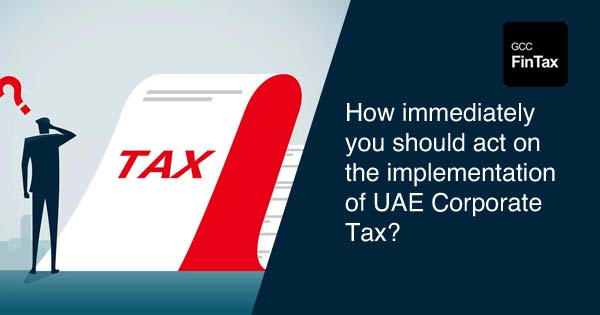
In my 10 years career span I have seen businesses treating tax as a middle child. Who’s your real child, definitely important, but often gets neglected. Most of the time, this negligence lands you in unhappy situations.
UAE and the region have emerged in the tax world facing the same situation, and with new taxes, new taxpayers, and new tax regulating authorities; it all made sense. However, we witnessed the commitment of tax authorities to align with the international tax standards, raise awareness, and develop themselves. Workshops were conducted, guides were issued, and penalties were levied to an extent that large enterprises had to discontinue their operations. We saw the landing of many businesses in what we called an unhappy situation.
In continuation of the aforementioned developments, we all are aware of the Corporate Tax announcement in the UAE. Another middle child, who needs your attention at the right time with the right focus. Businesses with no tax functions or professionals in the house are seemed to be on a wait and watch policy until their profits are taxable, i.e., from 2024 (for most of them). This article is for all the UAE-based businesses and their decision-makers for understanding how important it is for them to act immediately and the more time you would get is the less you will have, depending on the size of your business.
As we know, a building does not start from the surface, we need to develop strong foundations for a building to stand. There are multiple steps you would need to take before going live with the implementation of corporate tax in your business and each step will taketime. Below is the non-exhaustive list of the relevant points, you would need to know and work on before going live:
As I mentioned, it is a non-exhaustive list and can go on further depending on the nature and size of your business. But I believe it is enough to help you identify how immediately you would need to act probably with the initial impact assessment to implement a compliant and tax-efficient practice. In the end, you would not want to land in an unhappy situation, would you?
Disclaimer: Content posted is for informational & knowledge sharing purposes only, and is not intended to be a substitute for professional advice related to tax, finance or accounting. The view/interpretation of the publisher is based on the available Law, guidelines and information. Each reader should take due professional care before you act after reading the contents of that article/post. No warranty whatsoever is made that any of the articles are accurate and is not intended to provide, and should not be relied on for tax or accounting advice.
You can access Law including Guidelines, Cabinet & FTA Decisions, Public Clarifications, Forms, Business Bulletins for all taxes (Vat, Excise, Customs, Corporate Tax, Transfer Pricing) for all GCC Countries in the Law Section of GCC FinTax